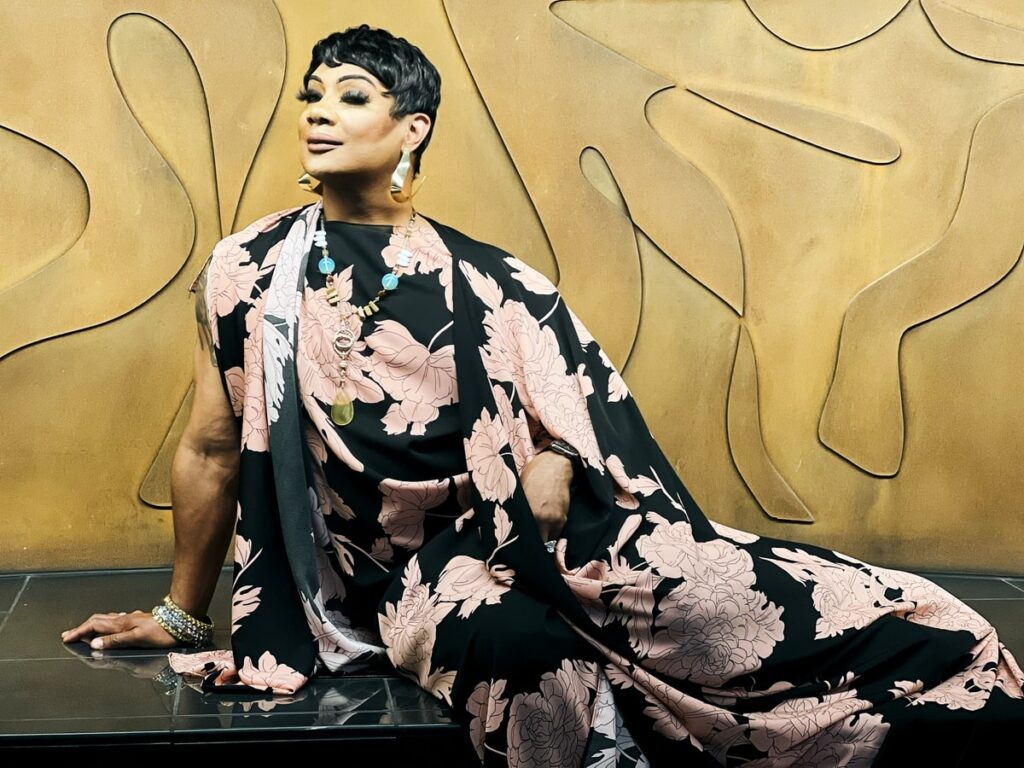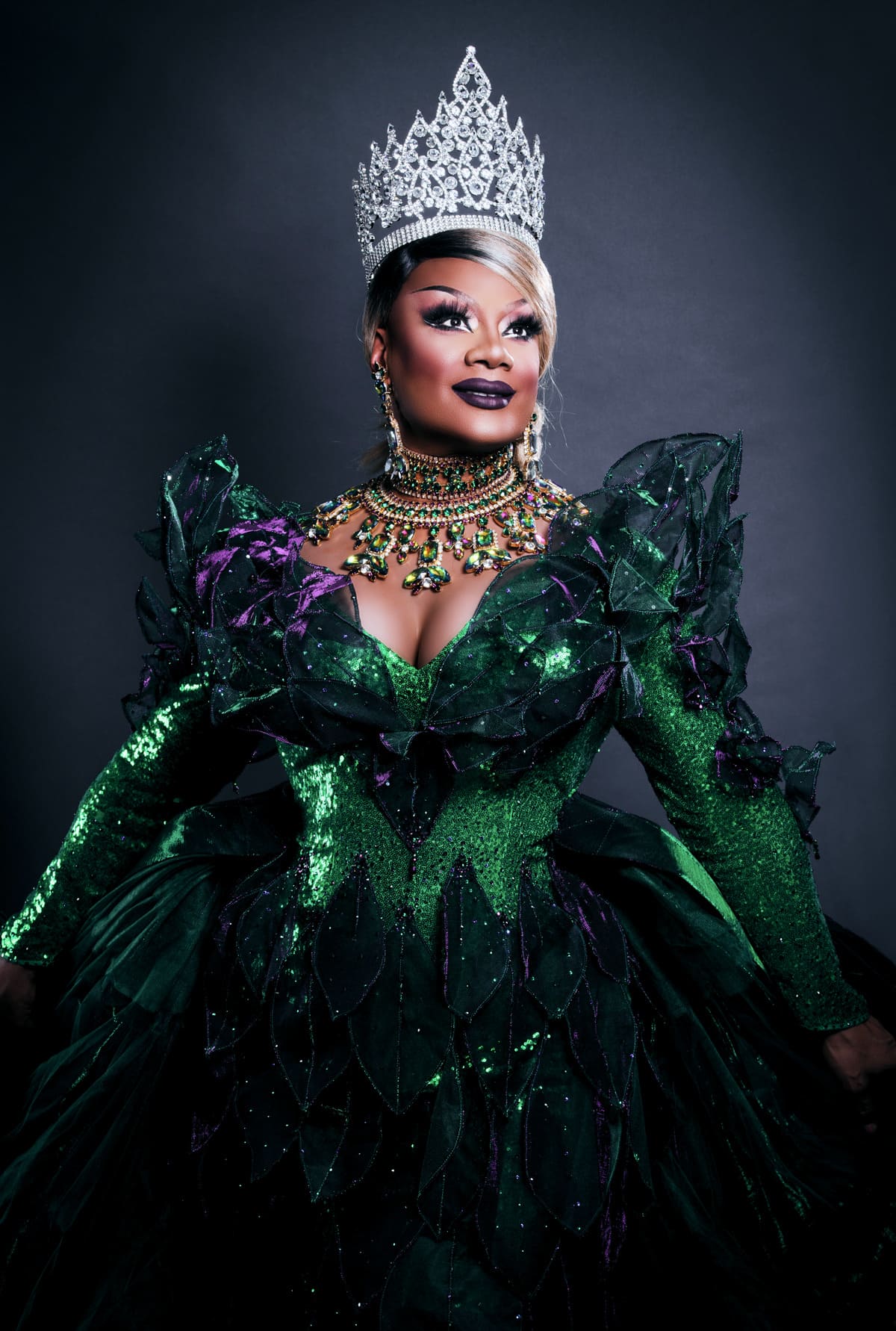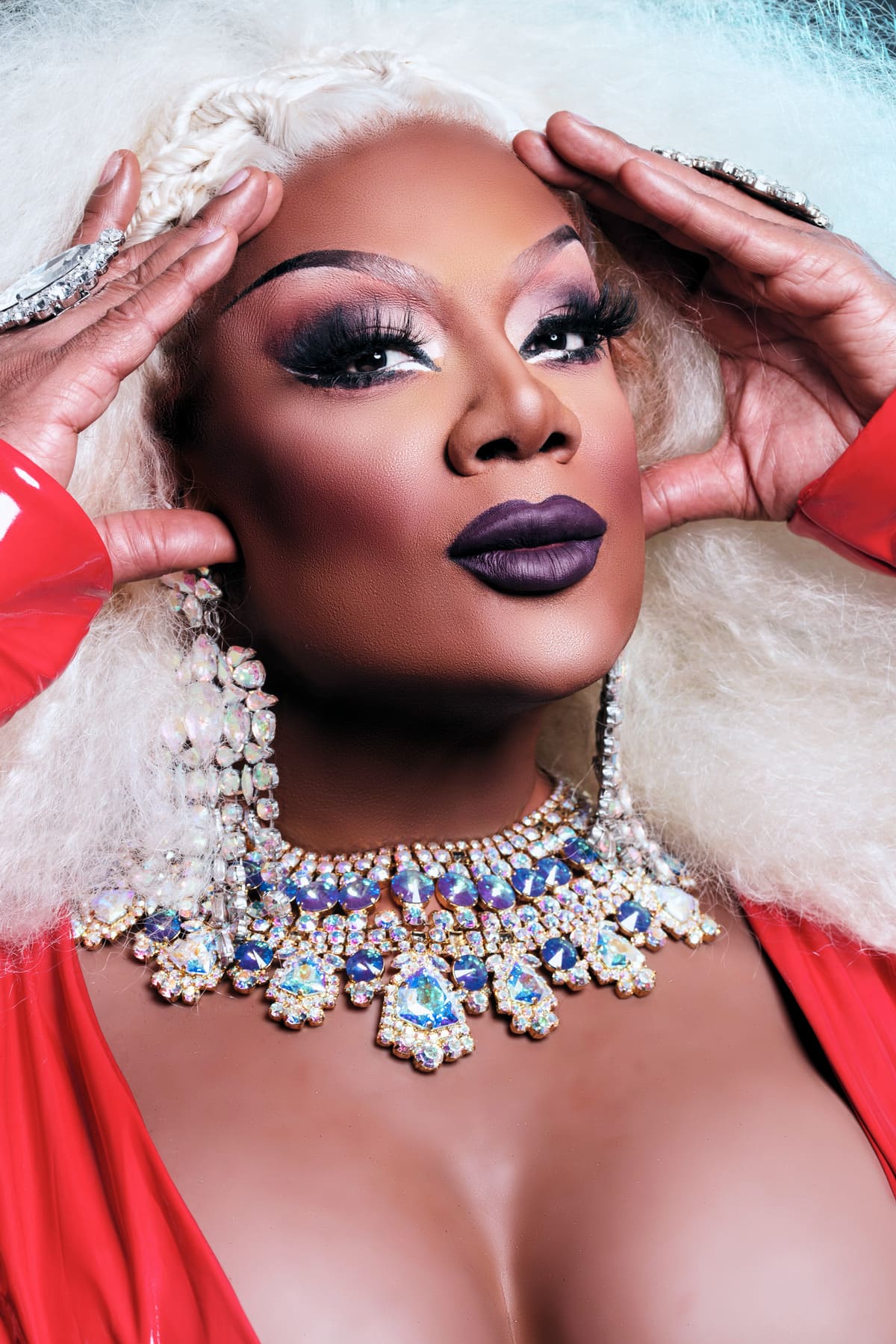
Drag, Activism, and the Power of Rebirth
Written By: Lindsay Heiman

Exploring the Power of Drag as a Tool for Healing, Empowerment, and Social Change
Lonnie Haley, known onstage as Mercedez Munro, is a dynamic figure in the world of drag, using performance as a powerful tool for self-expression and advocacy. Through Mercedez, Haley has reclaimed personal identity while paving the way for marginalized voices in the drag scene. As a performer, house mother, and activist, Haley’s story is one of resilience and transformation, leaving a lasting legacy within the LGBTQIA+ community.
Lonnie Haley, known in the drag world as Mercedez Munro, is much more than just a performer. For Haley, Drag has served as a powerful medium for self-acceptance, activism, and building a legacy. Haley’s journey into drag during the 1990s was not an easy one, particularly as a Black, queer individual navigating an industry and community still grappling with deep-seated prejudice. “The most difficult thing for me to accept was probably myself,” Haley reflects, highlighting the intense pressure of balancing personal identity with societal norms and expectations. Drag, for Haley, was not only an avenue of artistic expression, it was also a path to reclaiming power and self-worth.

Mercedez Munro
The Power of Drag
Drag in the 1990s, particularly for performers of color, carried a significant stigma. Unlike today, when shows like RuPaul’s Drag Race have brought drag into the mainstream, the world Haley entered was far less welcoming. As a Black drag performer in a predominantly White scene, Haley often encountered barriers that went beyond the usual challenges of performing. “I didn’t see enough people that looked like me,” Haley recalls, emphasizing the scarcity of representation in the Kalamazoo drag community at the time. This lack of visibility for Black queens in a city celebrated for its diversity, after relocating to San Francisco created a complicated dynamic that left Haley questioning the inclusivity of spaces claiming to preach progressive values.
Despite these challenges, Haley found a way back into drag after nearly a decade-long break in San Francisco. The decision to return to performing wasn’t solely about personal expression; it was a deliberate act of reclaiming space in a community that hadn’t always made room for Black drag queens in the past. In 2007, Haley’s reentry into the drag scene was marked by winning the Miss Gay San Francisco pageant, an accomplishment that symbolized not just a personal victory but a broader statement on visibility and representation. “If there is little to no Black representation fighting for our space, I’m going to do it,” Haley asserts, emphasizing the need to create space for intersectional identities in a predominantly White drag scene.

Miss Gay San Francisco, 2007
“If they don’t have Black representation, I’m going to do it.”
Haley’s story is one of personal rebirth, but it’s also deeply tied to the collective progress of the LGBTQIA+ community. By taking the stage as Mercedez Munro, Haley created a space where marginalized voices—particularly Black and Brown voices—could be seen and heard. The San Francisco drag scene, celebrated for its inclusivity, still had blind spots when it came to racial diversity, and Haley’s presence helped challenge those gaps. Drag wasn’t just a performance; it was an act of defiance, a reminder that visibility matters, especially for those whose identities have historically been erased or marginalized.
But Haley’s influence goes far beyond the stage. As the house mother of the House of Munro, Haley plays a crucial role in mentoring younger drag performers, many of whom come from marginalized backgrounds. The House of Munro is a family in every sense of the word, built on shared values of mentorship, education, and giving back. Forty-eight members strong, the house functions as a support system for those who may not have found acceptance elsewhere, offering guidance on both artistry and life.
“Our primary mission is to teach my children how to be consummate professionals, well-informed business people, and equally, how to give back.”
For Haley, being a house mother is about more than teaching the craft of drag—it’s about building a legacy that extends far beyond individual achievements. The House of Munro is not just a performing collective; it’s a community of socially aware individuals who understand the importance of visibility, advocacy, and giving back. By mentoring the next generation, Haley is ensuring that the values of inclusion, philanthropy, and activism are passed on, leaving a lasting impact that benefits not only the LGBTQIA+ community but society at large.
Central to Haley’s legacy is the belief that drag is deeply connected to activism. Haley sees drag as more than entertainment—it’s a means of championing equality and justice. Throughout Haley’s career, activism has been a constant thread, whether it’s fighting for marriage equality, advocating for racial justice, or supporting marginalized communities. “We wouldn’t have the rights we have today if it weren’t for one drag queen throwing a brick,” Haley reminds us, referencing the pivotal role drag queens played during the Stonewall Uprising and the broader fight for LGBTQIA+ rights.
Haley’s work with the Imperial Council of San Francisco further illustrates this commitment to activism. The Imperial Council, a nonprofit organization that raises funds for underprivileged communities, is an example of how Haley uses drag as a platform for change. “It is so incredibly important for me to ensure that all aspects and all persons of color, gender, and gender non-conforming individuals are seen and represented,” Haley says, underscoring the need for intersectionality in advocacy. By uplifting marginalized voices and ensuring they are part of the conversation, Haley helps foster a more inclusive world.
The legacy of Haley’s activism is most evident in the work of the House of Munro. Haley’s focus on mentorship ensures that future generations of drag performers understand the importance of visibility and advocacy. By creating a space where marginalized individuals can thrive, Haley is contributing to a movement that seeks to make the world more just and all-encompassing for everyone.
Lonnie Haley’s journey as Mercedez Munro is, at its core, a story of transformation, resilience, and activism. Through drag, Haley found a way to reclaim personal identity and self-expression while also creating a platform for marginalized voices. But perhaps most importantly, Haley’s work as a house mother and activist ensures that this legacy of empowerment and inclusion will continue for years to come. As a performer, house mother, and community leader, Lonnie Haley challenges societal norms and elevates those often left out of traditional narratives. Through the art of drag, Haley’s legacy continues to shape the San Francisco drag scene, ensuring that the work of Mercedez Munro endures—rooted in empowerment, resilience, and community impact. With every step in Mercedez’s heels, Haley transforms personal reinvention into lasting change, leaving an enduring impact on the world of drag and beyond.
“I empowered myself… I can no longer hide who I am.
This is something that brings me joy.”
While Haley’s story emphasizes self-expression and activism, it also offers an opportunity to delve deeper into how drag serves as a form of therapeutic release and self-care, particularly for individuals in marginalized communities.
The pressures of societal expectations, racism, and discrimination can have profound effects on mental health, and drag, for many, becomes a way to reclaim power and find inner strength. For Haley, stepping into Mercedez’s heels isn’t just about performance—it’s about transforming pain into empowerment, creating a space where self-doubt can give way to confidence and joy. This transformation can be likened to a form of healing that goes beyond the external, touching the core of self-worth and identity. Many who turn to drag do so as a way to cope with the struggles of isolation or rejection they’ve experienced due to their gender, race, or sexual orientation.
In a world where LGBTQIA+ individuals, especially those of color, often face heightened mental health struggles, drag can serve as a reminder that self-care and creative expression are revolutionary acts. Haley’s journey into drag may have begun as a personal exploration, but it evolved into a way to heal the wounds caused by societal rejection and oppression.
For those who have found inspiration in Haley’s journey, the message is clear: drag, like life, is about continual transformation. It’s about finding the courage to embrace who you are and the power to uplift those around you. Haley’s legacy reminds us that the fight for visibility and inclusion is far from over, and it’s a fight worth continuing—for the next generation of drag performers, activists, and anyone searching for a way to live authentically in a world that often demands conformity.
Through performance, community building, and advocacy, Haley has opened doors for marginalized voices, offering them a space to thrive and be heard. As a mentor, Haley doesn’t just pass on the skills of drag but also the values of those trailblazing activists who came before—icons who fought for the freedoms that today’s performers now enjoy. Haley’s work encourages not just those within the drag community but all of us to think about how we can use our own platforms, no matter how small, to make the world more inclusive, vibrant, and compassionate. Each performance serves as a reminder that personal expression isn’t limited to the stage; it can take any form that challenges norms and uplifts others. Whether through drag, art, or activism, Haley challenges us to embrace our own unique ways of contributing to a more accepting world, showing that every act of self-expression can be a step toward meaningful change.

Queen of self-expression, activism, and building a lasting legacy.
Queen of self-expression, activism, and building a lasting legacy
TrooRa Magazine
Social Media Credits:
@mercedez_munro
@lindsaymeetsworld_
Sources:
https://www.cbsnews.com/sanfrancisco/news/drag-queen-mercedez-munro-fights-for-equality/
Images by:
Lonnie Haley
Want The Print?
Get Waitlisted NOW!







